
 Two substantial platforms in the Gulf of America were subjected to comprehensive full-cycle offshore decommissioning campaigns by MC Offshore Petroleum, which also advanced environmental stewardship.
Two substantial platforms in the Gulf of America were subjected to comprehensive full-cycle offshore decommissioning campaigns by MC Offshore Petroleum, which also advanced environmental stewardship.
A multi-asset operation, the campaign involved the retirement of the Jolliet Tension Leg Well Platform (TLWP) in Green Canyon Block 184 and the fixed production infrastructure at Marquette comprising a production platform, GC52A, and a processing platform, GC52CPP, in Green Canyon Block 52. These will be further converted into an artificial reef in Green Canyon Block 52.
When installed as the first TLWP in the Gulf of America, Jolliet came to be known as the world's deepest floating production unit at the time of installation. The current campaign honours the platform's legacy while establishing a model for the next generation of offshore decommissioning excellence.
Right from the planning stage in 2022, MCOP has followed a strategy to execute the removals ahead of the peak months of hurricane season. The final decision to begin decommissioning operation was made in the first quarter of 2024. Decommissioning operations, along with the plug and abandonment of all wells on GC 52-A (Marquette) and GC 184 (Jolliet), were set to begin with an execution team in place by the second quarter of 2024.
With the well P&A work underway, pipeline abandonment operations begun as three pipelines were flushed and abandoned. The project team also abandoned another 24-mile pipeline belonging to a midstream operator that originated at GC52.
The decommissioning of the Jolliet TLWP and removal of GC52A and GCS2CPP was made possible with high-level engineering work. Disconnecting the TLWP tendons from the template, ballasting the JOLLIET TLWP during tendon removals and towing the platform to Port Aransas were backed by extensive planning.
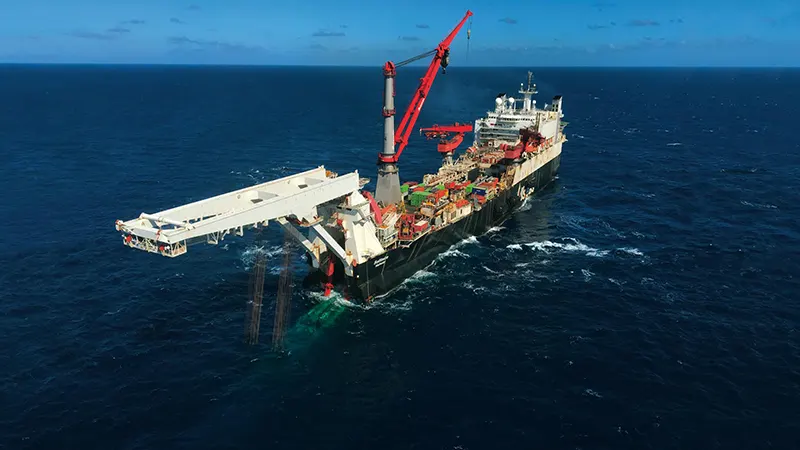
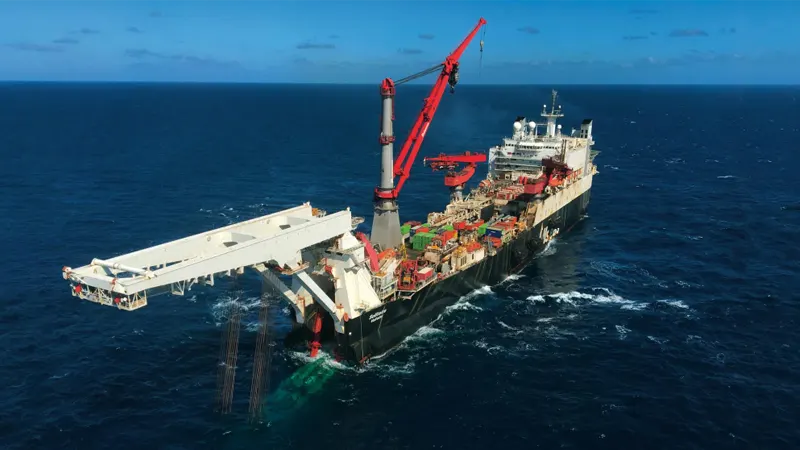 In a strategic move to strengthen the energy export network of the US Gulf of Mexico, Shell and Chevron have joined forces once again through their Amberjack Pipeline Company joint venture.
In a strategic move to strengthen the energy export network of the US Gulf of Mexico, Shell and Chevron have joined forces once again through their Amberjack Pipeline Company joint venture.
The partnership has awarded offshore contractor Allseas a major contract to install the Rome Pipeline, a 150-km, 24-inch trunk line designed to boost oil transport capacity from Shell’s Green Canyon 19 platform to the Louisiana coast.
This vital new link will expand Shell’s extensive Gulf of America pipeline system, enhancing export efficiency and operational flexibility across the region’s offshore network. The project underscores Shell and Chevron’s ongoing commitment to modernising and optimising oil transport infrastructure in one of the world’s most productive offshore basins.
Installation will be executed in two main phases. The nearshore section, scheduled for 2027, will be handled by Allseas’ automatically positioned anchor barge Sandpiper. Following that, the dynamically positioned pipelay vessel Solitaire—one of the most advanced ships of its kind will take on the deepwater installation in 2028. Together, these operations will form a critical artery within the Gulf’s subsea network, ensuring smooth and secure flow of hydrocarbons to shore.
The Rome Pipeline builds on the long-standing collaboration between Shell, Chevron, and Allseas, following the successful completion of previous ventures such as the Amberjack Debottleneck Project in 2016.
With an impressive record of more than 8,000 km of subsea pipelines safely installed in the US Gulf, Allseas continues to play a key role in shaping the region’s energy infrastructure. This new project not only reinforces its technical excellence but also represents a significant milestone in sustaining the Gulf’s vital oil and gas exports for years to come.
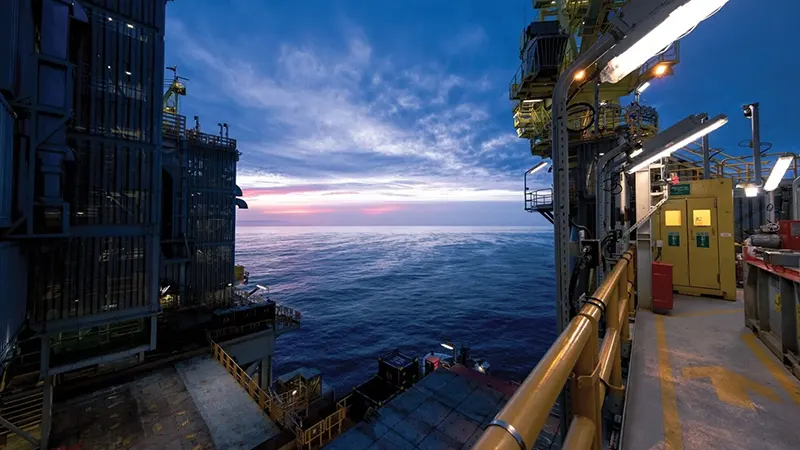
 Operator of the Hebron platform, Aker Solutions has secured a five-year enabling contract with ExxonMobil Canada Properties, a partnership.
Operator of the Hebron platform, Aker Solutions has secured a five-year enabling contract with ExxonMobil Canada Properties, a partnership.
An extension for brownfield maintenance and modification (M&M) services on the platform, the contract becomes valid for another five years. The company claims it to be a significant extension to the original engineering, procurement, and construction (EPC) enabling agreement awarded in 2015.
“We will leverage our multi-discipline Project Execution Model to deliver fit-for-purpose solutions with speed and precision, ensuring successful outcomes while reducing costs," said Paal Eikeseth, Executive Vice President and head of Aker Solutions' Life Cycle Business.
The work will be led from Aker Solutions’ location in St. John’s, Newfoundland and Labrador, where the company has increased its staff from 100 to 350 employees in recent years.
“We are pleased to continue our collaboration with ExxonMobil Properties, as operator of the Hebron platform, offshore Newfoundland and Labrador. Canada is a key market for us, where we take a long-term view and continue to deliver strong customer value through our capabilities,” said Eikeseth.
The contract will be booked as an order intake in the fourth quarter of 2025 in the Life Cycle segment.
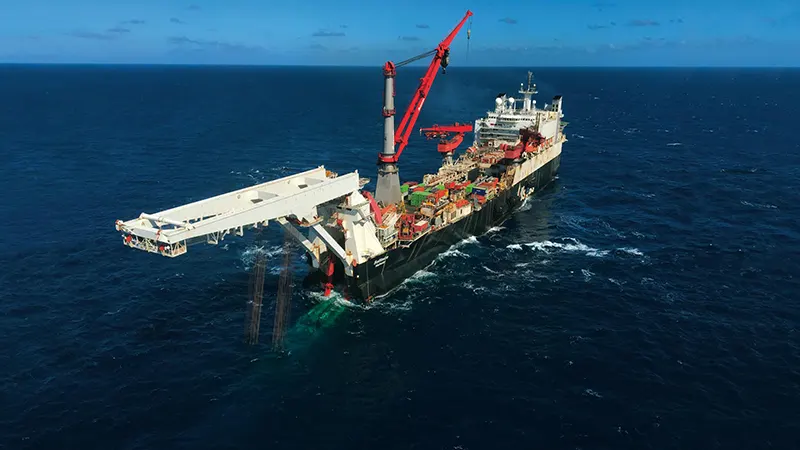
 Pipeline operator, Shell Pipeline Company LP, has selected Allseas for the installation of a new export pipeline to enhance oil transport capacity, flexibility and efficiency in the central of Gulf of America.
Pipeline operator, Shell Pipeline Company LP, has selected Allseas for the installation of a new export pipeline to enhance oil transport capacity, flexibility and efficiency in the central of Gulf of America.
The company will bring decades-long extensive expertise in delivering this large-scale, strategic energy infrastructure in the Gulf.
Awarded on behalf of Amberjack Pipeline Company LLC, a joint venture between Shell Pipeline Company LP and Chevron Pipe Line Company, the contract will include the installation of the 150-kilometre, 24-inch Rome Pipeline stretching from Shell’s Green Canyon 19 (GC-19) platform to the Louisiana coast. The line will add vital capacity to Shell’s extensive Gulf of America pipeline network.
Allseas’ scope includes engineering, procurement and installation of the pipeline. Our automatically positioned anchor barge Sandpiper will execute the nearshore section in 2027, followed by dynamically positioned pipelay vessel Solitaire for the deepwater section in 2028.
“We are proud to once again be entrusted with the delivery of a strategic deepwater pipeline in the Gulf of America,” said Frank Kluwen, General Manager Allseas USA. “This award demonstrates Allseas’ expertise, track record and ability to execute complex projects safely and efficiently."
The Rome Pipeline is part of a broader strategy to expand and modernise Gulf of America export infrastructure, building on projects such as the Amberjack Debottleneck Project, executed by Allseas in 2016.
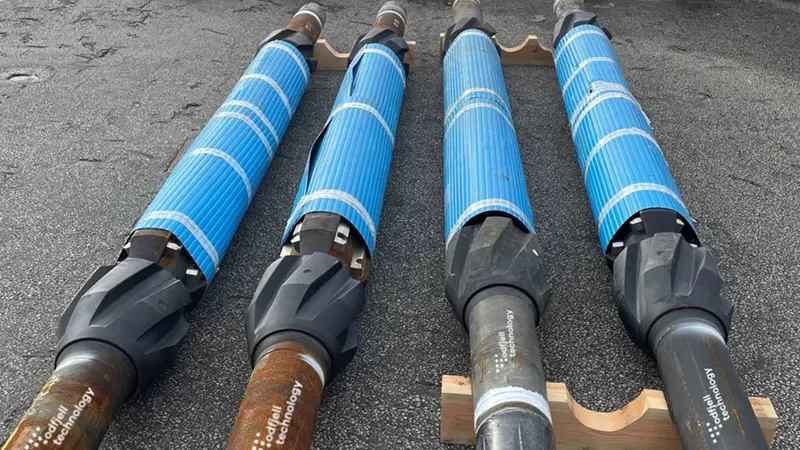
 Odfjell Technology has achieved a major milestone with the successful first large-scale delivery of high-performance Well Services equipment to the Americas.
Odfjell Technology has achieved a major milestone with the successful first large-scale delivery of high-performance Well Services equipment to the Americas.
This achievement represents a key advancement in strengthening the company’s operational readiness and expanding its footprint across the region.
The shipment is en route to Odfjell Technology’s new Gulf of America (GOA) base, where it will immediately enhance the availability of local tools and greatly improve mobilisation efficiency for upcoming projects. The carefully curated equipment package is designed to support some of the most challenging well operations, including deepwater milling and whipstock activities, ensuring clients benefit from prompt and dependable service.
Among the cutting-edge tools delivered is the UltraMag HD Casing Magnet, a specialised debris recovery system engineered for maximum performance in retrieving metallic debris. Incorporating rare earth magnet technology, the UltraMag HD ensures effective wellbore cleaning, minimising equipment damage risks and reducing costly non-productive time (NPT) for clients.
This accomplishment underscores Odfjell Technology’s ongoing dedication to operational excellence and customer satisfaction. By strategically positioning critical technologies in major regional hubs, the company ensures that its operations across the Americas, and especially its key GOA customers, have rapid, direct access to the equipment and solutions necessary for safe, efficient, and cost-effective well interventions.

 In its latest comprehensive report and digital platform titled 'Gulf of America Forward', National Ocean Industries Association (NOIA) has acknowledged the Gulf of America as a prominent offshore energy region, setting standards for industry dynamism, innovation, economic strength, and national security.
In its latest comprehensive report and digital platform titled 'Gulf of America Forward', National Ocean Industries Association (NOIA) has acknowledged the Gulf of America as a prominent offshore energy region, setting standards for industry dynamism, innovation, economic strength, and national security.
The report has particularly highlighted the region's environmental stewardship through programmes such as Rigs to Reefs, which saw the transformation of hundreds of decommissioning platforms into thriving marine habitats. This significantly contributes to the region's reputation in producing some of the lowest-carbon barrels in the world, backed by path-breaking technology and consistent environmental progress.
"The Gulf of America is not a legacy asset, it’s a strategic platform for America’s energy leadership," said NOIA President Erik Milito. "It gives our nation a crucial edge in a rapidly evolving global energy landscape. As global demand rises, driven by population growth, AI-powered data centers, electrification, and industrial expansion, the Gulf of America is uniquely positioned to meet that challenge. With world-class reserves, advanced technology, a highly skilled workforce, and strong environmental stewardship, it delivers secure, affordable, and lower-emission energy to Americans and our allies."
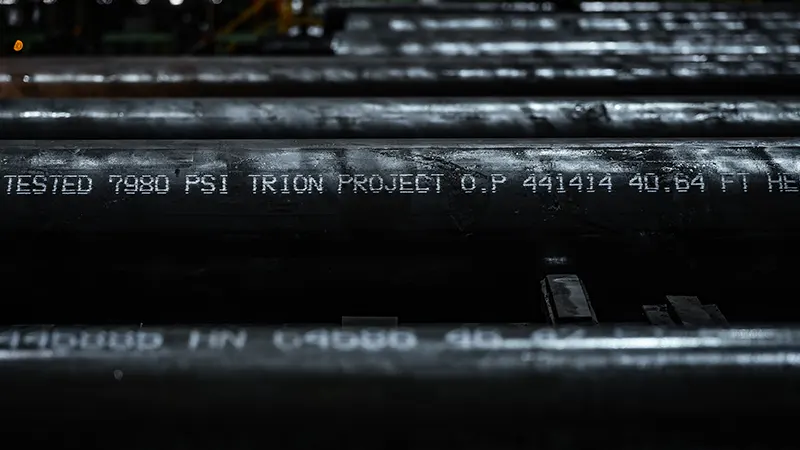
 As part of Trion project's subsea infrastructure development, Woodside Energy has employed Tenaris for casing and tubing services, alongside line pipe and coatings for bends, flowlines and risers.
As part of Trion project's subsea infrastructure development, Woodside Energy has employed Tenaris for casing and tubing services, alongside line pipe and coatings for bends, flowlines and risers.
Located in the Perdido Fold Belt, approximately 180 kilometers off the Mexican coastline, Trion is a highly anticipated deepwater project from Mexico that is set to generate first oil in 2028, with a nameplate production capacity of 100,000 barrels per day. A greenfield project at a water depth of 2,500 meters, Trion is being developed by Woodside-affiliate, Woodside Petroleo Operaciones de México, S. de R.L. de C.V. (Operator, 60%) and Pemex (40%).
Following its Rig Direct service model, Tenaris will supply 12,000 tons of casing and tubing, including 1,600 tons in the Super 13 Chrome steel grade. For the line pipe portion, the company will deliver approximately 16,000 tons of pipe for flowlines and risers, including the application of TenarisShawcor Marine 5-Layer Syntactic and Solid Polypropylene for flow assurance, and TenarisShawcor Fusion Bonded Epoxy, Three-Layer Polypropylene, and Liquid Epoxy coatings for corrosion protection. Line pipe and coatings will be supplied along with One Line project solutions.
“Trion represents a historic milestone for Mexico’s energy future, and we are proud to be part of it,” said Pablo Gómez, Tenaris Commercial Vice-President in Mexico. “This project underscores the strength of our customer partnerships and our ability to deliver advanced technological solutions for the most demanding offshore environments.”
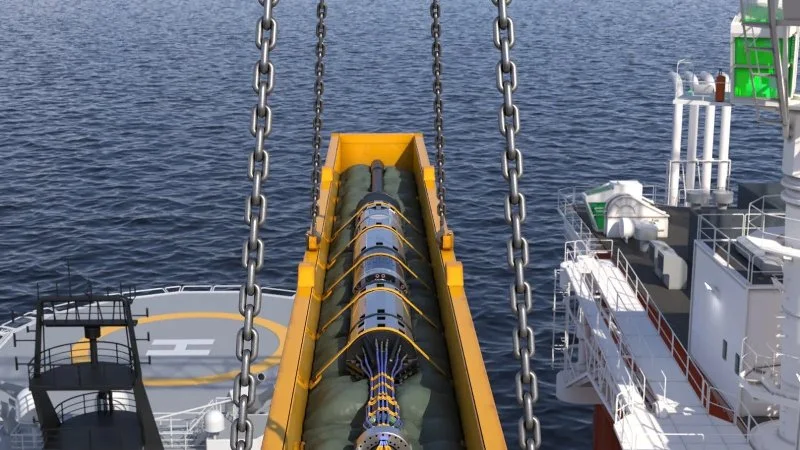
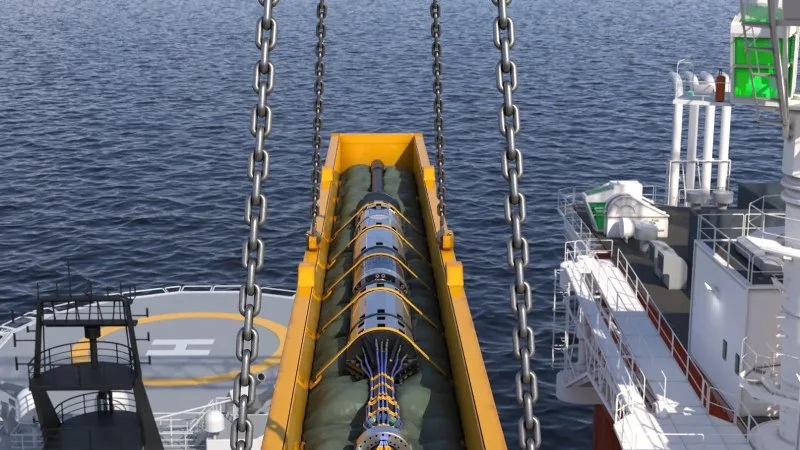
Halliburton has entered into a framework agreement with Shell to deliver umbilical-less tubing hanger installation and retrieval services using its Remote Operated Controls Systems (ROCS) technology
The agreement follows a successful three-well technology phase in the Gulf of Mexico, which demonstrated ROCS's effectiveness in deepwater conditions.
The collaboration marks a significant advancement in deepwater operations. With its speed, precision, and safety benefits, ROCS offers operators a reliable and cost-effective alternative to traditional methods, paving the way for its broader adoption across global rig fleets.
Josh Sears, senior vice president of Halliburton’s Drilling and Evaluation division, explained that ROCS is a compact, umbilical-less control system that replaces conventional hydraulic setups, helping to reduce surface pressure risks and limit personnel exposure. Already deployed in the Norwegian Continental Shelf, West Africa, and the Gulf of Mexico, ROCS recently achieved a milestone with the installation of a tubing hanger at 8,458 ft, setting the record for the deepest umbilical-less operation to date.
Developed by Optime, a Halliburton service, ROCS technology enhances operational efficiency by enabling faster running-in and pulling-out-of-hole procedures compared to conventional systems. It improves downhole line tests and reduces deck operations by up to 75%, ensuring higher safety and productivity during installation.
With its proven performance and measurable results, ROCS is redefining well-completion standards in deepwater environments. As operators increasingly seek smarter and safer ways to complete wells in challenging conditions, ROCS stands out as a proven solution that meets the demands of modern deepwater operations.
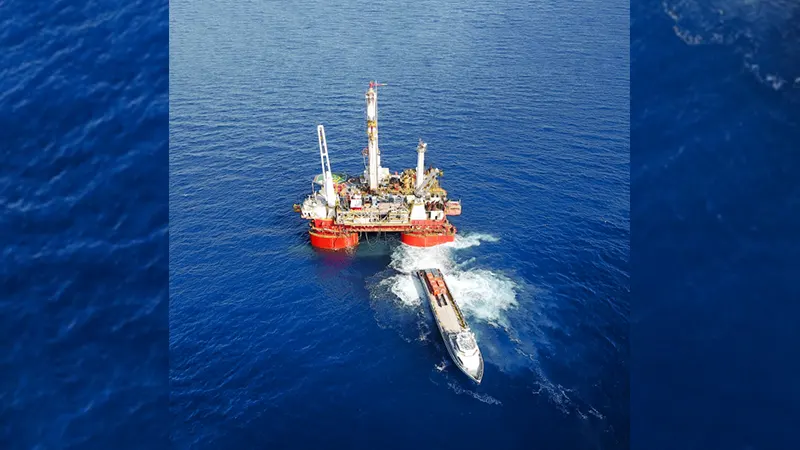
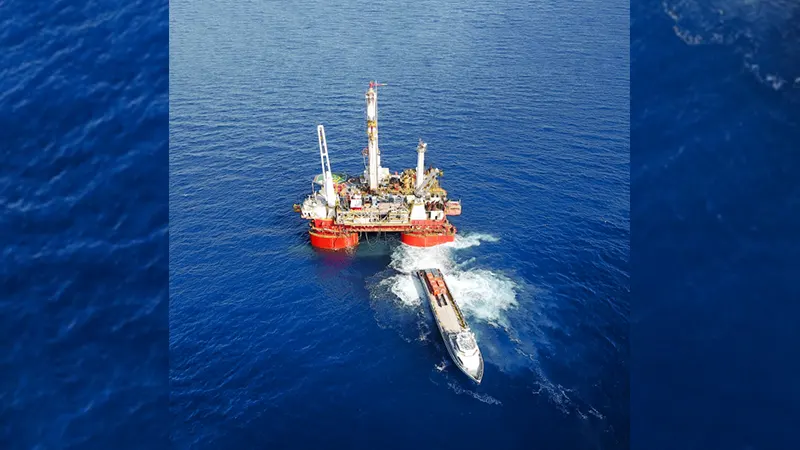 Helix Energy Solutions Group has reported a strong turnaround in its financial performance for the third quarter of 2025, posting a net income of US$22.1mn.
Helix Energy Solutions Group has reported a strong turnaround in its financial performance for the third quarter of 2025, posting a net income of US$22.1mn.
This marks a significant improvement from the US$2.6mn loss in the previous quarter, though slightly below the US$29.5mn recorded in the same period of 2024.
The company’s Adjusted EBITDA climbed to US$103.7mn, more than double the US$42.4mn achieved in Q2 2025, and higher than the US$87.6mn posted in Q3 2024. Third-quarter revenues also strengthened, reaching US$376.9mn, compared with US$302.3mn in the preceding quarter and US$342.4mn a year earlier.
For the first nine months of 2025, Helix reported net income of US$22.6mn on US$957.3mn in revenue, slightly lower than the US$35.5mn profit on US$1.003bn earned in the same period last year.
Owen Kratz, President and CEO of Helix, said the company’s latest results represent its highest quarterly EBITDA since 2014, demonstrating the business’s growth potential. “The strong Q3 results provide insight into the business’s earnings potential,” he said, noting the achievement came despite downtime on the Q4000 and the Seawell rigs being stacked.
Following the improved performance, Helix has revised its full-year 2025 Adjusted EBITDA guidance upwards to between US$240mn and US$270mn, and now expects free cash flow generation of US$100mn to US$140mn.
Operationally, the company saw robust results across several divisions. The robotics segment benefited from increased trenching and renewable energy operations, while the shallow water division recorded higher levels of activity.
Helix also secured key commercial contracts, including a four-year robotics trenching agreement in the North Sea and a Well Intervention contract in the Gulf of America.
Revenues in the Well Intervention segment grew 23 per cent sequentially, driven by higher utilisation of the Q5000 and Q7000 rigs, while robotics revenues increased 16 per cent thanks to stronger trenching demand. The shallow water abandonment division saw the sharpest rise up 47 per cent due to higher utilisation of the Epic Hedron vessel and improved asset activity.

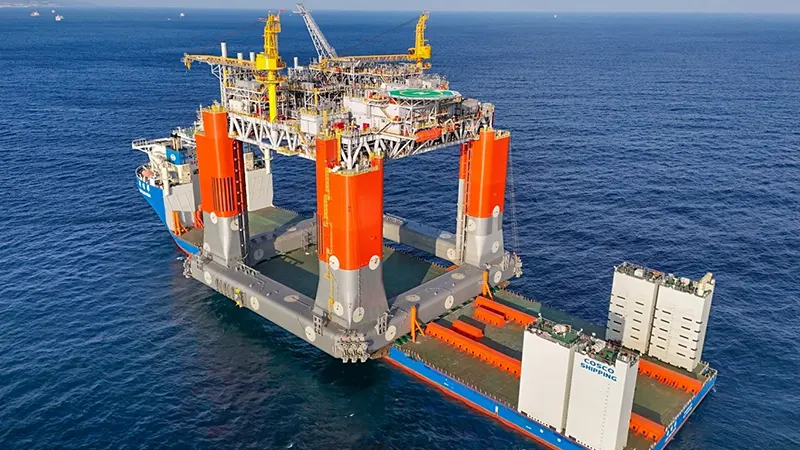 As part of Phase 1 development, four wells in the Shenandoah field have been ramped up by Beacon Offshore Energy to attain the target rate of 100,000 bopd / 117,000 boepd.
As part of Phase 1 development, four wells in the Shenandoah field have been ramped up by Beacon Offshore Energy to attain the target rate of 100,000 bopd / 117,000 boepd.
The Shenandoah floating production system (FPS) has proved its top tier operability as it delivered exceptional well productivity, reliability and uptime metrics, while accomplishing the ramp up target within 75 days following first production.
The Shenandoah reserves, located at reservoir depths of approximately 30,000 ft true vertical depth, are being developed utilising industry leading high pressure 20,000 psi technology which Beacon expects to facilitate development of other similarly situated fields in the Inboard Wilcox trend.
The Shenandoah FPS located on Walker Ridge 52 approximately 150 miles off the coast of Louisiana in a water depth of approximately 5,800 feet has a nameplate capacity of 120,000 bopd and 140 mmcfd. The Shenandoah FPS has been designed as a regional host facility that will enable development of additional resources including the Beacon-operated Monument and Shenandoah South discoveries which together with Shenandoah are expected to hold recoverable resources of nearly 600 MMBOE. Beacon is working alongside HEQ Deepwater and Navitas Petroleum to develop the Shenandoah project.
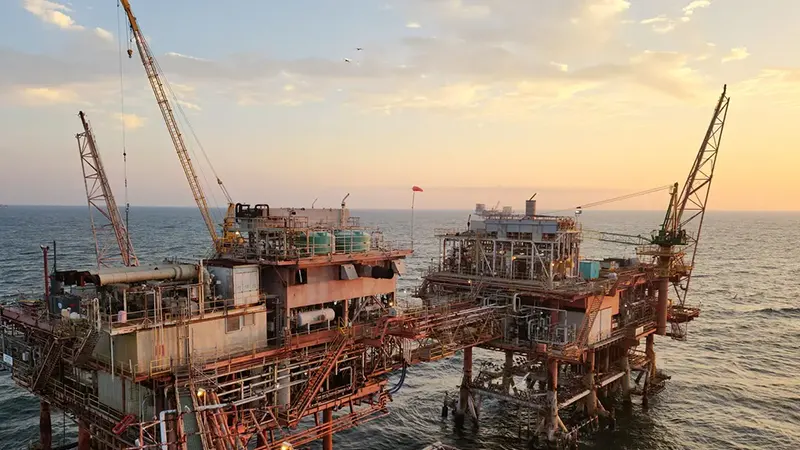
 Navigating the pressures of burgeoning decommissioning liabilities of North America and the Government-flagged urgency for immediate action, Petrofac recently initiated the 'Boomerang' project, mobilising a team to take over custody of the field in only a month.
Navigating the pressures of burgeoning decommissioning liabilities of North America and the Government-flagged urgency for immediate action, Petrofac recently initiated the 'Boomerang' project, mobilising a team to take over custody of the field in only a month.
The company's extensive experience and industry connections allow it to equally leverage the local and global supply chain, thus offering a resonable and customised service with the best suited equipment and crews, in a very tight and competitive market. Such measures helped Petrofac deliver the significant Danos decommissioning project in the Gulf of Mexico by collaborating with more than 250 vendors. It saw Petrofac tackling end-to-end decommissioning services, from project management, planning and engineering to procurement, field execution oversight and fast-tracking mobilisation of industry-leading experts.
To achieve cost efficiency that forms the core of Petrofac's approach to decommissioning, the company resorts to new approaches and innovations to match the project scale.
For instance, deploying compact, low-cost crews for pre-decommissioning activities, involving diagnostic and wellhead maintenance work can ensure better planning, permitting and cost estimating.
Other economic ways employed by the company includes well work delegation to groups of 3-6 people, alongside equipment upgradation, crew utilisation and ensuring minimal non-productive time.
“This significant contract recognises our industry-leading decommissioning programme management experience and our unique in-house capability to manage all well and asset decommissioning phases.
“Four decades of global expertise will be applied to the project, complemented by our already strong onshore presence in Texas,” said Iain Murray, President, Americas, Asset Solutions.
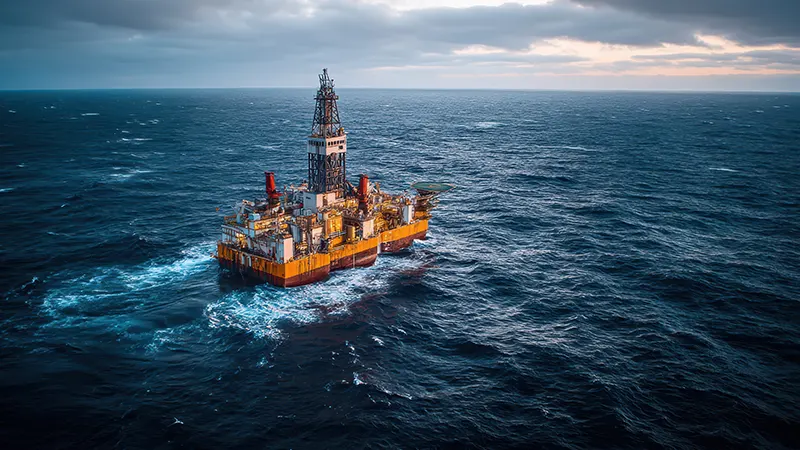
 As the recent well test on the State 36-2 LNW-CC-R well from Zephyr Energy's Paradox project reflected considerable well productivity, the company announced an updated Competent Person's Report (CPR) that was compiled by independent energy consulting and advisory firm, Sproule-ERCE International Limited
As the recent well test on the State 36-2 LNW-CC-R well from Zephyr Energy's Paradox project reflected considerable well productivity, the company announced an updated Competent Person's Report (CPR) that was compiled by independent energy consulting and advisory firm, Sproule-ERCE International Limited
This acknowledgement has allowed Zephyr Energy to transition the Paradox project from appraisal to development, as the well test revealed high reservoir pressure, reservoir quality and liquid yields, leading to a significant boost in recoverable reserves across all reserve categories.
Based on the performance of the Cane Creek reservoir on 20,000 acres held within Zephyr's White Sands Unit, the CPR confirmed a 93-fold increase in Proved Recoverable Reserves (1P Reserves), demonstrating the site's scale and immediate production potential. It will be able to deliver 14.8 million net barrels of oil equivalent proved recoverable reserves, an increase from 0.16 million net boe in the 2022 CPR.
Speaking of the Paradox project, Colin Harrington, Chief Executive of Zephyr, said, "To date, we have drilled two successful, one-mile horizontal wells utilising different completion technologies and both demonstrated strong deliverability and expanded our completion design options for the greater field development. We have also gathered a substantial amount of data that will help inform future development plans. Furthermore, we have acquired significant infrastructure that will enable us to bring the project into full production, including gas gathering lines, plant infrastructure, permits and future water disposal wells, and we are close to securing gas export capacity. All this has been achieved at low development costs, especially when compared with many other new field startups of a similar size, and this infrastructure should enable accelerated project development once a suitable partner is secured. It should be noted that while acceleration of drilling activity and increased gas processing capacity won't change undiscounted free cash flow totals, they would enhance the current NPV-10 value of the project by bringing forward future cashflows."
Page 2 of 23
Copyright © 2025 Offshore Network